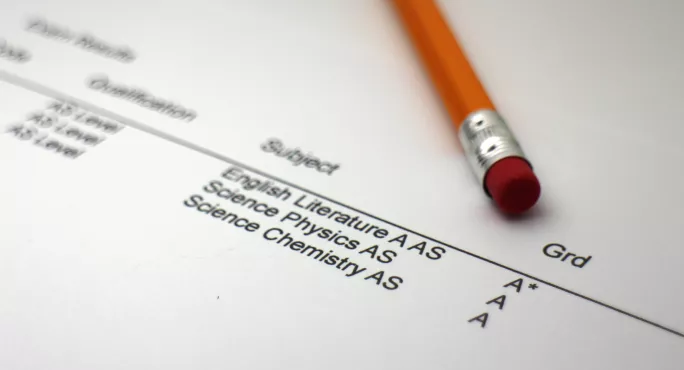
- Home
- iGCSE students ‘perform worse at A level’
iGCSE students ‘perform worse at A level’

Independent school pupils taking iGCSEs tend to achieve lower A-level grades than expected, compared with those who take GCSEs, a new analysis by the Department for Education shows.
The analysis focused on progression from key stage 4 to A level within the main EBacc subjects.
It looked at whether pupils who take international GCSEs are better prepared for A levels, and make more progress between key stage 4 and key stage 5 as a result.
It found that independent school pupils taking exams through both iGCSE-awarding organisations, Cambridge Assessment International Education and Pearson, had lower average A-level attainment, compared with their expected grades, than their peers who took GCSEs.
Read: Government to look at IGCSE university entrance ‘loophole’
Exclusive: Top unis’ GCSE demands ‘favour private pupils’
Viewpoint: ‘The “easy” IGCSE argument is really about much bigger issues’
The difference on average amounted to one-sixth of a grade for pupils taking Cambridge iGCSEs and more than a quarter of a grade for pupils taking Pearson iGCSEs.
iGCSEs and A levels
The research report says: “Looking at progression to individual A-level subjects in the main EBacc subjects for a previous cohort of independent school pupils who were mostly at the end of key stage 4 in 2016, pupils who entered IGCSEs (Cambridge) in a subject achieved, on average, around a sixth of a grade lower than expected at A level than pupils who entered a GCSE in that subject.”
Students taking iGCSEs performed relatively worse in A-level English language and literature than students taking GCSEs, while achievement in the languages was largely similar.
But there were finer differences between the iGCSE qualifications provided by the two awarding bodies.
Pupils taking Cambridge iGCSEs in English literature, English language, history, geography, French and biology all achieved a statistically significant lower A-level grade than their GCSE peers.
However, Cambridge iGCSE pupils did statistically better than GCSE pupils in maths and physics, by 0.7 and 0.2 grades respectively - but entries in these subjects were small, the report states.
In German, chemistry and Spanish these students performed, on average, just as well as GCSE pupils.
Those taking Pearson iGCSEs did worse in maths and the sciences at A level - by 0.2 to 0.4 grades.
They also performed worse in English language, English literature, German, history and geography, by about 0.1 to 0.3 grades.
Pearson iGCSE students did not attain significantly higher grades at A level than GCSE pupils in any subject.
The key stage 4 picture
However, the picture was different when looking simply at key stage 4. The research compared how iGCSE students and GCSE students performed against their expected grades at this level.
On average, across all subjects, independent school pupils taking GCSEs performed similarly to those taking Cambridge iGCSEs, while average scores were about a quarter of a grade higher for those taking Pearson iGCSEs.
But this differed by subject: pupils taking Cambridge iGCSEs achieved higher grades in English and English literature than those taking GCSEs, but lower grades in the sciences.
For Pearson iGCSEs, pupils achieved higher grades than expected in English language, English literature, mathematics, German and Spanish, but there was no clear difference for chemistry, French and history.
In a letter to the Education Select Committee, the Minister of State for School Standards Nick Gibb said that on the basis of comparisons of data for 2018, that there is “no evidence” of systematic differences in standard between Cambridge’s IGCSEs and GCSEs.
However, he added, “there is some evidence that Pearson’s International GCSEs were graded slightly more generously on average than GCSEs in that year.”
Cambridge International CEO Christine Özden said: “We welcome this confirmation that Cambridge IGCSE is aligned closely with the GCSE. We are completely committed to maintaining comparability with GCSE.
“The content and structure of Cambridge IGCSE was a model for the new GCSE in England, so we take some pride as the new GCSE becomes more established.”
A Cambridge International spokesperson later added: “We remain interested in the Department for Education’s (DfE) findings, but they are contrary to everything we know about Cambridge IGCSEs being excellent preparation for A Level. The DfE’s analysis and findings are based on very small amounts of student data.
“Our own long term analysis uses a much broader data set and a range of subjects to assess progression in students and their achievements at A Level. Our analysis very clearly shows that Cambridge IGCSE is excellent preparation for students wishing to go on to study A Levels.”
A Pearson spokesperson said: “ We review, monitor and adjust qualifications regularly to ensure comparability. The findings from DfE’s data analysis of 2018 results reflects this, with relatively small differences of around two or three marks for a subject.
“We recognise there are some valid comparability points raised in our English Language Coursework international GCSE qualification. We have started work already to act on this - our processes ensured that in 2019 we had taken action by adjusting the coursework boundaries and we will continue these adjustments in 2020.”
Pearson also said that it will complete specific research into mathematics outcomes during 2020, adding that the Department’s findings were not consistent with the organisation’s findings for 2018 and 2019.
Register with Tes and you can read five free articles every month, plus you'll have access to our range of award-winning newsletters.
Keep reading for just £4.90 per month
You've reached your limit of free articles this month. Subscribe for £4.90 per month for three months and get:
- Unlimited access to all Tes magazine content
- Exclusive subscriber-only stories
- Award-winning email newsletters
You've reached your limit of free articles this month. Subscribe for £4.90 per month for three months and get:
- Unlimited access to all Tes magazine content
- Exclusive subscriber-only stories
- Award-winning email newsletters



